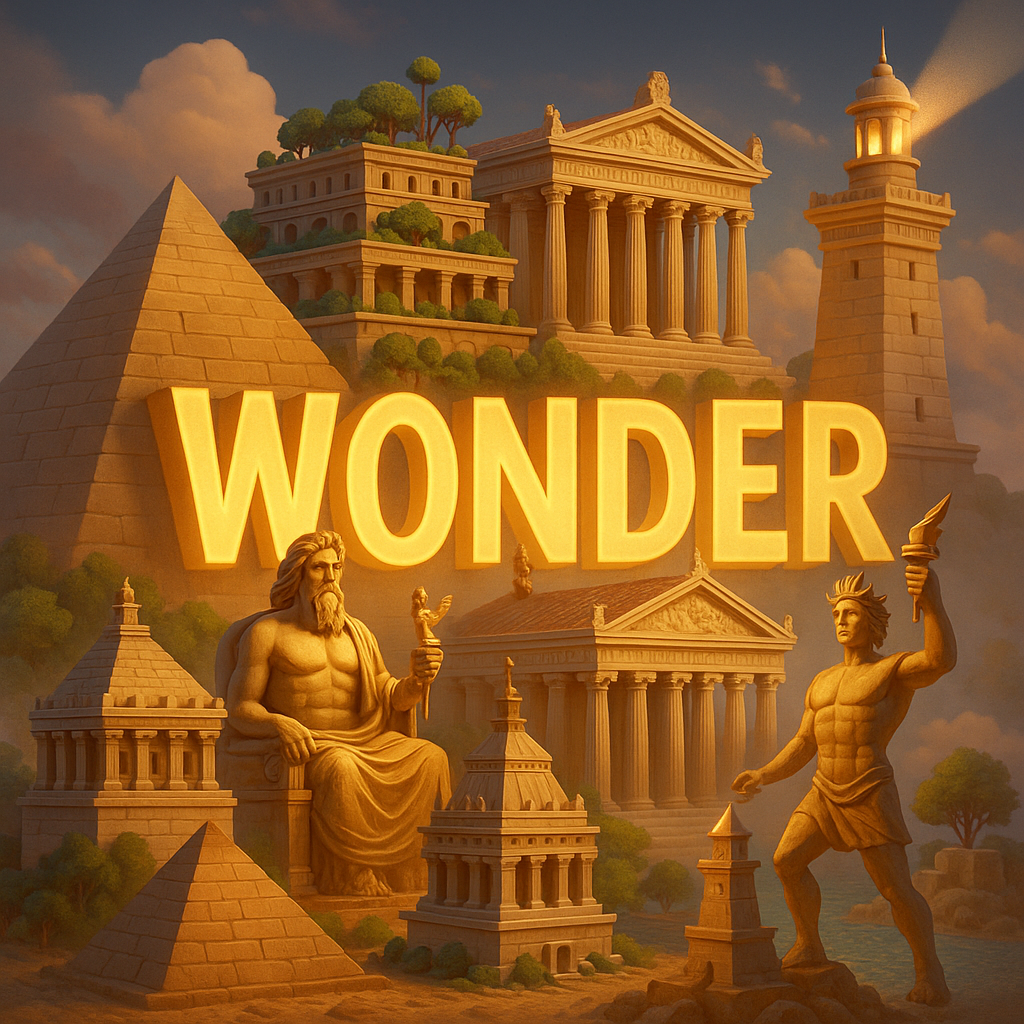Wonder
Definition
Wonder refers to a feeling of amazement or curiosity caused by something remarkable or unfamiliar. It can also mean the act of questioning or pondering something.
Parts of Speech
- Noun
- Verb
Pronunciation
American English
- IPA Pronunciation: /ˈwʌn.dɚ/
- Respelling: WUN-der
British English
- IPA Pronunciation: /ˈwʌn.də/
- Respelling: WUN-duh
Etymology
The word "wonder" originates from Old English "wundor," meaning "marvel" or "astonishment." It is derived from Proto-Germanic "*wundran" and Proto-Indo-European "*wen," meaning "to desire" or "to strive." Its modern usage includes emotional and intellectual contexts.
Derivatives
- Wonderful (adjective)
- Wondrous (adjective)
- Wonderingly (adverb)
- Wonderment (noun)
- Wondersome (adjective, rare)
Synonyms
- Amazement
- Marvel
- Awe
Antonyms
- Indifference
- Unconcern
- Boredom
Usage
The term "wonder" is often used to express amazement or curiosity. As a noun: "The Grand Canyon is a natural wonder." As a verb: "I wonder if it will rain today." It can also appear in phrases like "no wonder," indicating obviousness.
Related Terms
- Curiosity: A strong desire to learn or know something.
- Astonishment: A feeling of great surprise or amazement.
- Speculation: The act of forming theories or conjectures.
Detailed Definitions
Noun
- A feeling of amazement caused by something remarkable: Refers to emotional reactions to the extraordinary.
- Example: "The fireworks show filled the crowd with wonder."
- Something remarkable or extraordinary: Describes an event, object, or phenomenon that inspires awe.
- Example: "The seven wonders of the ancient world are marvels of architecture."
Verb
- To feel amazement or admiration: Describes experiencing a sense of awe.
- Example: "I wonder at the beauty of the sunset."
- To question or speculate about something: Refers to curiosity or doubt.
- Example: "She wondered whether she had made the right decision."
wonder



🇨🇳 Mandarin Chinese
- Qíguài (Wonder - as in surprise)
- IPA: /tɕʰi˧˥ kwai̯˧˥/
- English Respell: Ch'i-kwai
- Xiǎng (Wonder - as in ponder)
- IPA: /ɕi̯ɑŋ˨˩˦/
- English Respell: Syahng
🇮🇳 Hindi
- Aashcharya (Wonder - as in surprise)
- IPA: /ɑːʃˈtʃərjə/
- English Respell: Ash-chur-ya
- Sochna (Wonder - as in ponder)
- IPA: /soʊtʃˈnɑː/
- English Respell: Soch-na
🇪🇸 Spanish
- Maravilla (Wonder - as in surprise)
- IPA: /maɾaˈβiʎa/
- English Respell: Mara-viya
- Preguntarse (Wonder - as in ponder)
- IPA: /pɾeɣunˈtaɾse/
- English Respell: Pregun-tarse
🇫🇷 French
- Merveille (Wonder - as in surprise)
- IPA: /mɛʁ.vɛj/
- English Respell: Mair-vey
- Se demander (Wonder - as in ponder)
- IPA: /sə dɑ̃.mɑ̃.de/
- English Respell: Seh damonde
🇦🇪 Modern Standard Arabic
- عجبا ('Ajaba - Wonder as in surprise)
- IPA: /ʕaʤaban/
- English Respell: 'Ajaban
- تساءل (Tasa'ala - Wonder as in ponder)
- IPA: /tasaʔala/
- English Respell: Tasa'ala
🇧🇩 Bengali
- অবাক (Obak - Wonder as in surprise)
- IPA: /ɔbak/
- English Respell: Obak
- চিন্তা করা (Chinta kora - Wonder as in ponder)
- IPA: /tʃin̪t̪a kɔɹa/
- English Respell: Chinta kora
🇷🇺 Russian
- Удивление (Udivleniye - Wonder as in surprise)
- IPA: /ʊdʲɪˈvlʲenʲɪje/
- English Respell: Udivlyeniye
- Интересоваться (Interesovat'sya - Wonder as in ponder)
- IPA: /ɪntʲɪrʲɪsɐˈvat͡sɨjə/
- English Respell: Interesovatsya
🇵🇹 Portuguese
- Maravilha (Wonder - as in surprise)
- IPA: /mɐɾɐˈviʎɐ/
- English Respell: Maravilha
- Perguntar (Wonder - as in ponder)
- IPA: /pɨɾˈɣũtɐɾ/
- English Respell: Per-goon-tar
🇮🇩 Indonesian
- Keajaiban (Wonder as in surprise)
- IPA: /kəad͡ʒaiban/
- English Respell: Keajaiban
- Bertanya-tanya (Wonder as in ponder)
- IPA: /bərtanja-tanja/
- English Respell: Bertanya-tanya
🇩🇪 German
- Wunder (Wonder as in surprise)
- IPA: /ˈvʊndər/
- English Respell: Vunder
- Fragen (Wonder as in ponder)
- IPA: /ˈfʁaːɡən/
- English Respell: Fragen
🇯🇵 Japanese
- 驚き (Odoroki - Wonder as in surprise)
- IPA: /odoɾoki/
- English Respell: Odoroki
- 疑問に思う (Gimon ni omou - Wonder as in ponder)
- IPA: /ɡimoɴ ni omoʊ/
- English Respell: Gimon ni omou
🇻🇳 Vietnamese
- Ngạc nhiên (Wonder as in surprise)
- IPA: /ŋaːk̚˧˩ ɲiən˧˧/
- English Respell: Ngac nhien
- Thắc mắc (Wonder as in ponder)
- IPA: /thak̚˦ˀ˥ maːk̚˦ˀ˥/
- English Respell: Thac mac
🇰🇷 Korean
- 놀람 (Nollam - Wonder as in surprise)
- IPA: /nolːam/
- English Respell: Nollam
- 궁금해하다 (Gunggeumhaehada - Wonder as in ponder)
- IPA: /kʌŋɡʌmhaehada/
- English Respell: Gunggeumhaehada
🇹🇷 Turkish
- Şaşırtıcı (Wonder as in surprise)
- IPA: /ʃaːɯɾˈtɯɾd͡ʒɯ/
- English Respell: Shasirtiji
- Merak etmek (Wonder as in ponder)
- IPA: /meˈɾak etmek/
- English Respell: Merak etmek
🇵🇰 Urdu
- تعجب (Tajjub - Wonder as in surprise)
- IPA: /t̪əd͡ʒʊb/
- English Respell: Tajjub
- سوچنا (Sochna - Wonder as in ponder)
- IPA: /sotʃna/
- English Respell: Sochna





